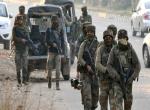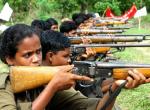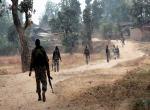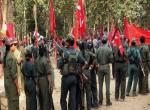It is a fact that Mamata Bannerjee and her party have done considerable damage to the anti-Maoist security mechanism in West Bengal, through her ‘no-hold- barred’ mission to capture power in West Bengal. Flush with a huge electoral win that has led her to the Chief Minister’s chair, her approach to the Maoist issue has been raising the anxiety levels of multiple stakeholders including those at the Centre, strategic observers, Security Forces; they are at a loss regarding the possible policy Mamata Bannerjee may adopt vis-a-vis Left Wing Extremism.
The apprehensions increased rapidly last week when the Home Secretary G K Pillai expressed a word of concern that the security operations against Maoists in Bengal have slowed down and the forces are being kept idle. The lack of coordination between para military forces and state police has increased manifold in the past few weeks. The situation was very different two months ago. The security operations had exerted a large amount of pressure on Maoists by maintaining momentum through repeated operations followed by a string of successes. But now, due to Mamata’s approach the momentum of operations against Maoists in West Bengal appears to be petering out.
“With the forces sitting idle, the Maoists are regrouping and making new recruitments. Top Maoist leaders Akash and Bikash are moving around. Now we are waiting to check out the Maoist policy of the new government”, CRPF IG, T. B. Rao said a few days ago. Incidentally, the Maoists in West Bengal virtually declared a ceasefire and even offered talks with the state government. In a statement released recently, CPI (Maoist) state committee member Bikram states, “We want Mamata to fulfil all promises she had made in the last year’s Lalgarh rally. We are even ready for talks with the state government. Mamata too has said she wants the forces to be withdrawn. Now, she should fulfil her commitment.” The intentions of Maoists who are on a back foot in West Bengal, militarily as well as politically, are very clear. They want to halt the security operations against them at least for some time till they finish new recruitments and regroup their cadre which has been destabilised through continuous operations and arrests of leaders.
The state government has halted operations in Jangal Mahal and other Maoist affected regions. Moreover, the central government, at the instance of the state government, is withdrawing around 15,000 paramilitary forces from West Bengal, retaining just 4000. The situation in West Bengal had certainly improved in the past few months, but such a hasty withdrawal of three-fourth of the forces may not be a wise decision. Due to Left Extremism 425 fatalities occurred in West Bengal in 2010, out of which 328 were civilians and majority of them were CPI (M) party cadres. Even though they have declared a virtual ceasefire, the Maoists have explicitly mentioned that they will not spare CPI (M) cadres. “The ceasefire does not mean that we will not wipe out the CPM’s corrupt leaders and cadres in our stronghold. Our operation to drive out CPM from Jangal Mahal will continue,” says a Maoist statement. If this is the situation, the numbers of killings by Maoists are expected to increase.
The Trinamool Congress (TMC) may have seen the partnership with the Maoists as another political tactic to vest power of the once Left oriented state. The country has silently witnessed many such lethal partnerships of political parties with Left Extremists earlier including those by the Congress in Andhra Pradesh, RJD in Bihar and JMM in Jharkhand. For the Maoists, there is nothing unholy with such a friendship as it is a part of their grand strategy to acquire power. Such alliances with political parties or rather ‘lesser enemies’ is one of the three magical weapons of Marxist-Leninist-Maoist (MLM) strategy. One of the most important documents of the CPI (Maoist) says “The aim of the united front is to isolate, weaken and destroy the main enemies one by one and win over the maximum possible forces opposed to the main enemies.” In West Bengal the main enemy for the Maoists even before the Naxalbari was the ‘revisionist’ CPI and then the CPI (M) and therefore the decision to win over TMC through Singur and Nandigram episodes and maintain a relationship till the assembly elections was quite logically part of the Maoist strategy.
Before coming to power, the TMC chief was thankful enough to the Maoists for every help given by them that she made the life of Chief Minister Buddhadeb Bhattacharya difficult at every occasion whenever he hit hard at the Maoists. She used to describe the anti-Maoist policies as state terrorism. Now, the million dollar question is what will be her policy towards the Maoists in West Bengal? She can no longer use the word state terrorism or blame the CPI (M) for ‘atrocities by police’ against the people of Jangal Mahal as she is the current authority of the state. What will she do then? It is a very important fact that the Maoists will never drop their arms in West Bengal just for the sake of maintaining friendship with the TMC. Mamata Bannerjee soon after the election results avowed that she will end Maoism in West Bengal through development. She may be able to reach out to the people of Jangal Mahal and initiate developmental work, but the Naxals, who see such alliances with political parties as a temporary tactical move, may not pay heed to her non-Maoist ideology and ideas. The Maoists may exploit the flexibility given by the new government to anti-Naxal operations and go for a ‘lie low and regroup’ strategy.
The Central government has been following a security forces heavy approach regarding Left Wing Extremism in West Bengal for past many years. But now the Centre may have to take a course of action as suggested by the government in the state ruled by one of its important political allies and reduce the force levels. Most of the senior security officials in the state as well as at the centre are highly apprehensive of what would be the consequences of such a line of action. This is also likely to have a negative impact on the high morale of the anti-Naxal security forces in West Bengal.
But practically, if Mamata does choose to continue with the security operations, it may not cost her much politically. The elections are over and she does not require another Singur or Nandigram in the near future and therefore she may not need the support of the Maoists for any immediate political issues. Despite a number of them being associated with the People’s Committee Against Police Atrocities (PCAPA), a Maoist front organisation, the people of Jangal Mahal have already proved that they are not embarking on the Maoist way. The district wise polling percentage was more than 80% in the three districts - West Midnapore, Bankura and Purulia. This is an important factor indicating the shifted mood of the people. Evidently, this has reduced the Maoist writ in Jangal Mahal. The PCAPA has lost much of its salience in Jangal Mahal. The people who rallied for it have found a better option in Mamata as their simple and only reason of frustration was the Left government, whom she successfully took on.
Before being shunted out of power the Left government had weakened the Maoists and the PCAPA to considerable degree. Most of their leaders including Telugu Deepak, Sudip Chongdar, Sidhu Soren, Shashadhar Mahato, Chatradhar Mahato and many others were arrested or neutralised. Kishenji, the most important leader of CPI (Maoist) in West Bengal is increasingly being criticised by the outfit for an almost failed strategy in the state. All these conditions may be enough to give confidence to the Chief Minister in adopting a hard line against the Maoists. Moreover she may get the fullest of support from the Home Minister at the Centre if the buck stops at her table.
The Maoist sympathising interlocutors who played the role of being a medium of communication between the TMC and the Maoists and were advisors to the TMC at Singur, Nandigram and even during the Lalgarh rally also seem to be apparently satisfied with the outcome of the 2011 elections and may not create much trouble for Mamata government for any policy against the Maoists.
The TMC supremo in the beginning had sent pointers that she may move towards taking strong steps against the Left Extremists. She had stated that under her regime Naxalism will come to an end in the state. But despite some loose statements, her line of action seems to be favouring Maoists in the long term. If she continues with a soft approach against Left Wing extremism in her state, it may douse the fire for a short period, but will open a window for a weak CPI (Maoist) to regroup their cadres in order to undertake a fresh offensive against the government forces and other targets with renewed energy.
-----------------------------------------
Published Date: 23rd June, 2011









Post new comment